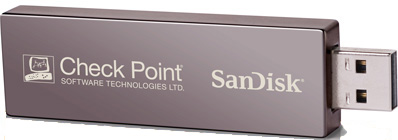Secure corporate desktop on USB stick

Check Point announced Check Point Abra, a solution which turns any PC into a fully secure corporate desktop. The Abra stick provides users access to company emails, files and applications anywhere whether offline or online through integrated VPN connectivity. It loads itself automatically on any PC, and contains local encrypted storage to protect any data stored on the device.

The device combines Check Point virtualization, VPN and security technologies with an encrypted SanDisk USB drive to create a secure, virtual workspace. Users simply plug an Abra stick into a Windows-based PC and enter their credentials to immediately turn any PC into a corporate desktop.
To safeguard sensitive data stored on it, the device utilizes several security measures. Hardware and software encryption protects data at rest and when in use. Program Control regulates the types of applications used by Abra to protect the corporate network from malware associated with unauthorized applications. Finally, virtualization technology isolates an Abra work session from the host PC, ensuring sensitive data remains on the stick and preventing data loss.
Features include:
- Standard Windows user environment
- Prevents data loss by controlling outgoing traffic to networks and websites
- File transfer control allows exchange of files between personal and corporate workspace environments to be controlled by security policy
- Compliance scanning automatically scans the host PC to ensure an antivirus solution from a known vendor is active on the endpoint
- User authentication enforces minimum password strength, as well as certificates and tokens for multi-factor authentication. A “virtual keyboard’ can be used at login to block password theft by key loggers
- Central management with Check Point SmartDashboard provides policy administration and updates through Check Point gateways, including authentication and compliance scanning rules and VPN settings.
Remote workers and contractors accessing the corporate network through personal or third-party equipment can put businesses’ sensitive data at risk and threaten the network. For example, mobile workers storing corporate data on a home PC could inadvertently expose company information when a child or another home user visits a peer-to-peer file sharing site or send attachments via instant message. Similarly, a contractor could accidentally send a business’ proprietary data to another client. Regardless of the intent, the potential damage from data loss is the same.